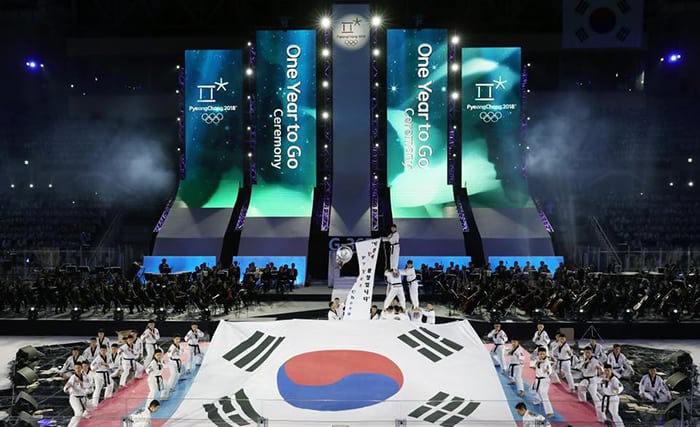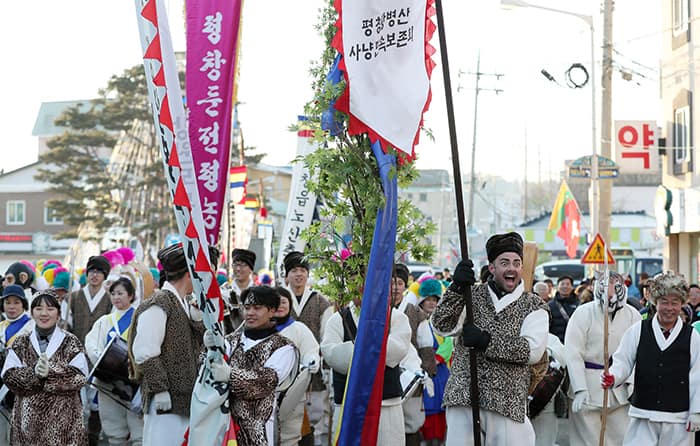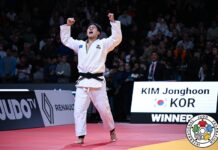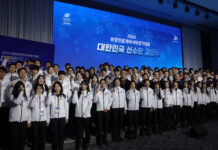
A taekwondo team from the First Republic of Korea Army (FROKA) performs as it waves a sign saying, ‘It’s you, PyeongChang,’ and the Taegeukgi national flag, during a ceremony to mark one year until the PyeongChang 2018 Olympic and Paralympic Winter Games, at the Gangneung Hockey Center in Gangneung-si, Gangwon-do Province, on Feb. 8, 2017.
By Sohn JiAe
The Olympic Games are a global sporting festival that brings together athletes and sports fans from around the world.
The Games pit athletes from around the world against each other and send sports aficionados into cries and cheers for their favorite Olympians.
The Olympic Games, however, are about more than just sports.
The Games can only be complete when they’re met with epic shows of cultural legacy, tradition, history and art from across the region, showing the host country in a favorable light.
Korea is now hosting the 2018 Winter Games, exactly three decades since it hosted the Seoul 1988 Olympics. In light of this, Korea has pulled out all the stops to make the upcoming winter sports festival a so-called “Cultural Olympiad,” an event that can offer visitors from around the world some of the best-ever unforgettable experiences and give them access to some of the nation’s greatest cultural assets.
“The Olympic Games are no longer what they used to be, merely a sporting event,” said Second Vice Minister of Culture, Sports and Tourism Roh Tae-kang. “They’ve turned into an event that shows the overall capacity of that particular country and its people, coupled with our heritage and an IT industry of our own. Hopefully, February’s PyeongChang Games will allow the global community to enjoy our cultural capacity,” the vice minister said.
On Feb. 9, the “Cultural Olympiad” will kick off across the three host cities in Gangwon-do Province: Pyeongchang-gun County, Gangneung-si and Jeongseon-gun County. The three cities will host multi-platform showcases for visitors from around the world, as well as for Korea’s own citizens, showing off Korea’s arts, heritage, entertainment industry and educational system.
Before and throughout the Olympic and Paralympic Games, global sports fans will be served cultural events of various genres, from opera, jazz, modern dance and musicals, all the way through to media art, modern and contemporary art and traditional folk games.
Hidden treasures of Korea, found in its festivals, performances
The 2018 PyeongChang Cultural Olympiad will begin with a magnificent opening ceremony in Gangneung-si, Gangwon-do Province, on Feb. 3, just six days ahead of the official PyeongChang Games Opening Ceremony.
It will be studded with outstanding domestic performers, alongside the declaration of its opening. Afterward, a series of performances will ensue in the coming days, including “Cheonnyeonhyang,” a non-verbal show that tells a story of the host cities’ scenic landscapes and the people who live there through dance coupled with advanced technologies. There will also be the “DMZ Art Festa 2018” that turns the nation’s wish for peace into performances, music and exhibitions, as Korea’s one of the few remaining divided countries in the world.
The Gangneung Olympic Park, the venue for speed skating, curling, ice hockey, figure skating and short-track speed skating, will entertain spectators with a variety of events, too.
Outdoor entertainment at the park includes a flash mob, a pantomime show, a cappella singing and a traditional pungmulnori percussion folk music performance. The indoor Gangneung Arts Center will have some of Korea’s representative dancing and singing troupes on stage, including the Korean National Ballet, the Korea National Contemporary Dance Company and the National Chorus of Korea.
Korea’s most-lauded classical musicians, such as cellist Chung Myung-wha and pianist Son Yeol-eum, will collaborate with counterparts from Russia, the host of the 2014 Winter Olympics, at the PyeongChang Winter Music Festival.
Exhibits, hands-on programs bring Gangwon-do’s nature, arts, peace to the world
The special “Cheongsan * gok” media art show will be held at the Gangneung Solhyang Arboretum in Gangneung-si. It will welcome visitors to an artistic world that unfolds in the mist of the forest, where visitors can see the trees and the paths turn into a whole new winter wonderland, transformed with the media arts.
The PyeongChang Olympic Plaza, a venue for both the official Opening and Closing ceremonies, will showcase works of art by some of Korea’s most famous modern and contemporary artists, from across painting, sculpture, installment art and media art. Artists such as Nam June Paik, Lee Jung-seob and Kim Whanki, and others, will be featured in a special exhibition called “Highlights of Modern Korean Arts.”
The plaza will also be home to the PyeongChang ICT Pavilion that will allow visitors to explore five core technologies, as well as the humanoid robots that will be used at Olympic venues. The five technologies are: fifth generation mobile networks (5G), the Internet of Things (IoT), ultra high definition broadcasts (UHD), artificial intelligence (AI) and virtual reality (VR).
A special exhibition at the Gangneung Arts Center will feature modern versions of paintings, visual art sculptures, and installation works by artists from Gangwon-do Province.
In Jeongseon-gun County, home to a particularly famous version of the folk song “Arirang,” there will be a collaboration among artists from Korea and the next two Olympic host countries — China and Japan — so as to send to the world a message of peace and unity through performances and conferences.
Note that only Olympic ticket holders with tickets for that exact day can enjoy the cultural programs free of charge at the PyeongChang Olympic Plaza and at the Gangneung Olympic Park.

Volunteers and other participants carry giant flags that bear the Olympic rings, in a street parade with traditional music and dance, during the annual Daegwallyeong Snow Festival in Pyeongchang-gun County, Gangwon-do Province, on Feb. 2, 2017.
The Oxford Dictionary defines culture as “the customs and beliefs, art, way of life, social organization and attitudes of a particular country.”
Well, next February in Korea, historic Olympic moments of Korean “culture” will take place all across Gangwon-do Province.
Hopefully, the story will reach other people, too, regardless of where they are or where they live, touching them deeply with Korea’s deep-rooted cultural legacies, legacies that will come to life in the form of festivals, performances and exhibits during the PyeongChang Games.
jiae5853@korea.kr























